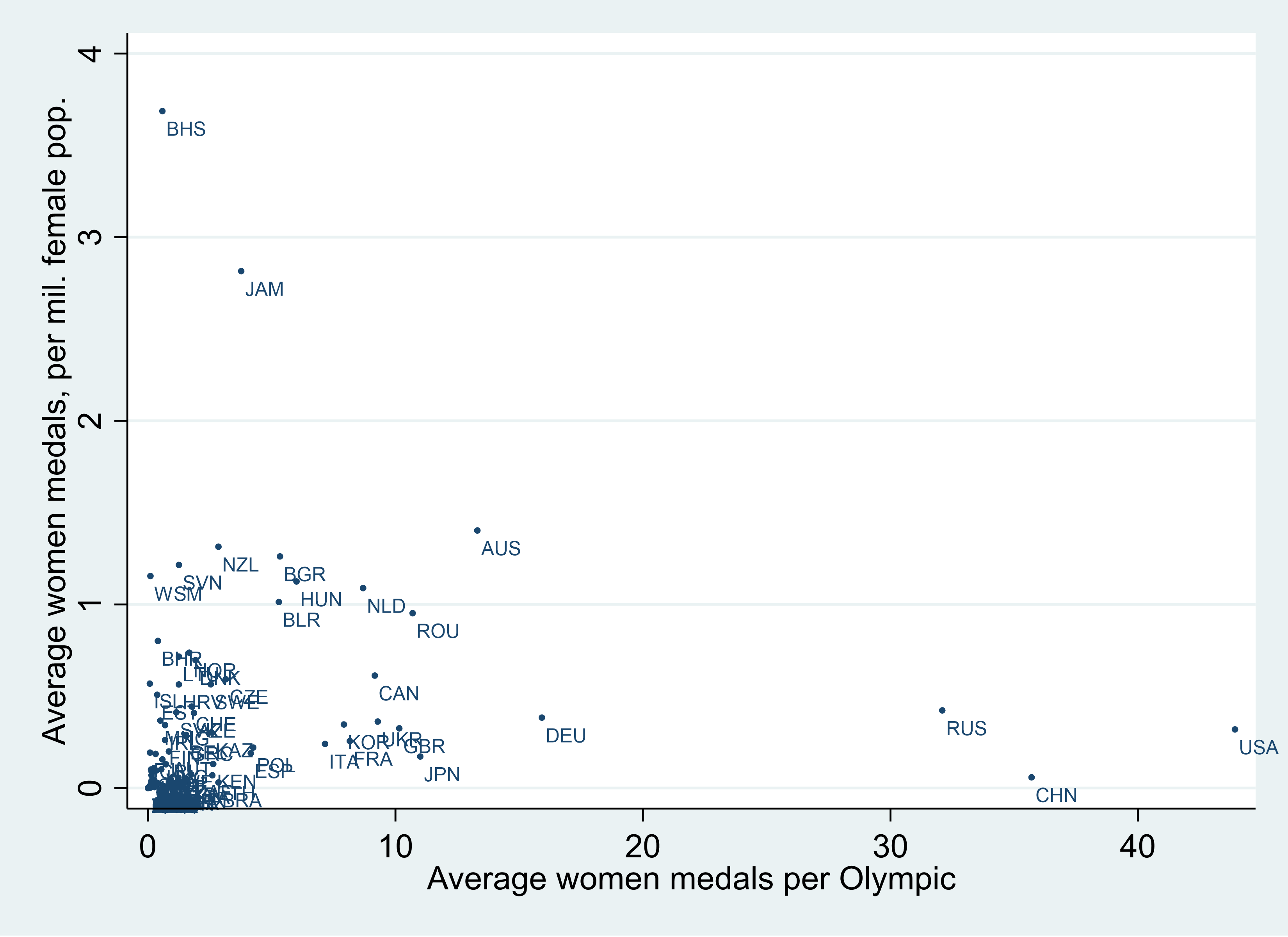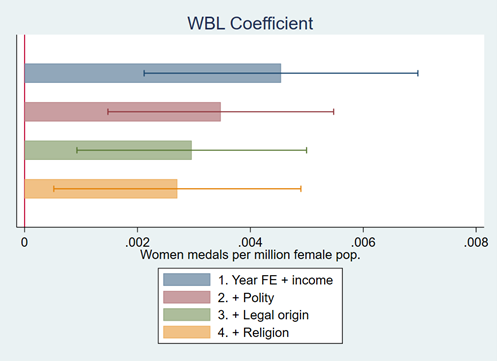Legal gender equality is key for female participation in the labour market. The association between women’s legal empowerment and success in sports is another manifestation of that. Using the Women Business and the Law (WBL) index, Simeon Djankov and Eva Yiwen Zhang construct a simple measure of Olympic success for female athletes: the number of medals per one million female population. They find that an improvement in the WBL score by 10 points is associated with one additional medal by a woman athlete for the average country.
Countries that treat women on equal legal footing with men tend to have more success in sports. As one measure of such success, the number of medals sportswomen receive at Olympic Games increases with the rise of equality of women and men under the law.
In recent research we find that legal equality is associated with fewer female workers in positions of vulnerable employment, and with greater political representation for women. The association between legal empowerment by women and success in sports is another manifestation of the relation between law and practice.
Gender equality and Olympic medals
The Women Business and the Law (WBL) index captures the inequality in legislation that a woman faces as she navigates her working life, from the time she can enter the labour force through to retirement. Countries receive a score ranging from zero to one hundred based on the level of legal gender equality. A score of one hundred implies that there are no legal inequalities between men and women in the areas covered by the index. The global average WBL score in 2020 is 76.1, implying that, on average, women around the world have approximately three quarters the rights of men when it comes to laws affecting their economic opportunity. Only ten countries in the world — Belgium, Canada, Denmark, France, Iceland, Ireland, Latvia, Luxembourg, Portugal, and Sweden — receive a perfect score of 100, all high-income OECD countries.
The data used in this analysis cover the past 13 Olympics Games, with the first competition in the sample taking place in 1972. (The Olympic participants and medal count data prior to 2021 are retrieved from Han and Noland (2020) and the 2021 data are retrieved from Olympics.com [last accessed September 9, 2021]. Countries that have participated in less than half of the games since 1970, i.e., less than 7 out of 13 games, are removed from the sample. The medal count for countries that did not participate in particular Olympics is marked as missing.) We construct a simple measure of Olympic success for female athletes: the number of medals per one million female population.
One noteworthy exclusion from the sample is that of East Germany. The historical record for women’s Olympic success was distorted by East Germany’s vigorous doping program, which hurt athletes’ lives beyond athletics. Noland and Stahler (2014) estimate that the East German doping program was responsible for 17 per cent of the medals awarded to female athletes in the 1970s and 1980s. We hence exclude East Germany from the analysis.
The countries that have had the most success at Olympic Games over the past half century are shown in Figure 1. The Bahamas won the most female medals per million female population, with an average of 3.7 medals per Olympics. This success is followed by Jamaica with an average of 2.8 female medallists, and further by New Zealand, Australia, Bulgaria, Slovenia, the Netherlands, Samoa, Hungary, and Belarus. The average WBL score for these top ten performers is 88 in 2020, 12 points above the global WBL average.
Figure 1. Success of women athletes at Olympics, by country (averaged over Olympic Games since 1972)
We next correlate the female medals’ count with several country characteristics. These come in three groups, and they are added to the analysis:
- A measure of the extent of democracy;
- A measure of the country’s legal origin;
- And a measure of prevalent religion.
The correlation coefficients between the measure of success in sports and the WBL score under different model specifications are presented in figure 2. The basic model represented by the top bar in the chart captures the link between medals won and the WBL score three years ahead of the Olympic year, while controlling for year fixed effects and a country’ income per capita. The bars below represent the partial correlation while adding another group of controls to the previous model, so that the bottom bar cumulates year fixed effect, income per capita, democracy scores, legal origin, and religion characteristics. In previous research we also use several proxies for geography, though their coverage is smaller than for other explanatory variables. Their usage further reduces the size of the WBL coefficient.
Figure 2. Correlation between the WBL index and female success at Olympics

Note: The figure displays the beta coefficient and the associated confidence interval in a regression model that estimates women’s Olympic success. The top bar represents the coefficient on the WBL index variable under regression model that controls for a country’s lagged income level and year fixed effect. The second bar from top adds measures of the extent of democracy; the third bar adds a measure of the country’s legal origin; and the bottom bar adds a measure of the dominant religion. Source: Authors’ calculations.
The partial coefficient on the WBL score using the first outcome measure (medals per million female population) implies that an improvement in the WBL score by 10 points is associated with one additional medal by a woman athlete for the average country. (The average female population for the 206 countries participating in the 2020 Tokyo Olympic is 20 million.) Take the United States as an example: A hypothetical improvement in the WBL score by 9 more points (to a perfect 100) would correspond to 7 more Olympic medals. This partial correlation remains statistically significant even after adding controls of the level of democracy, religion, and legal origins, though the size of the coefficient is reduced by about half.
We next run a sensitivity analysis to account for the impact of boycotts. The 1970-2021 sample period includes three Olympic boycott years (1976, 1980, and 1984). The major absences of 1980 in Moscow (the United States and their allies) and 1984 in Los Angeles (the Soviet Union and their allies) are likely to balance out the results on women’s success in medals. However, the 1976 Montreal Games boycott, where 28 African countries withdrew from competition, may boost our findings. The analysis is rerun excluding these three Olympic Games, and we find the WBL coefficients to be largely unchanged and to remain statistically significant under all specifications. For example, the value of the WBL coefficient from the basic model (i.e., the top bar in Figure 2) falls from 0.0046 to 0.0045, while remaining significant at the 1 per cent level.
Reform impetus
These results are unlikely on their own to provide impetus for legal equality reform. Put together with previous findings, however, they enhance the case for legal change: even in such physically strenuous careers as sports, the law is associated with better actual performance by women in the labour market. Such change may not only bring the first female medals to countries like Kuwait, Jordan, Pakistan, and Togo (so far countries without Olympic glory for female athletes) but create a better work environment for the millions of women whose jobs do not make the news.
♣♣♣
Notes:
- This blog post represents the views of the author(s), not the position of LSE Business Review or the London School of Economics.
- Featured image by Secretaria Especial do Esporte (Danilo Borges /ME /Brasil 2016), under a CC-BY-NC-SA-2.0 licence
- When you leave a comment, you’re agreeing to our Comment Policy.





